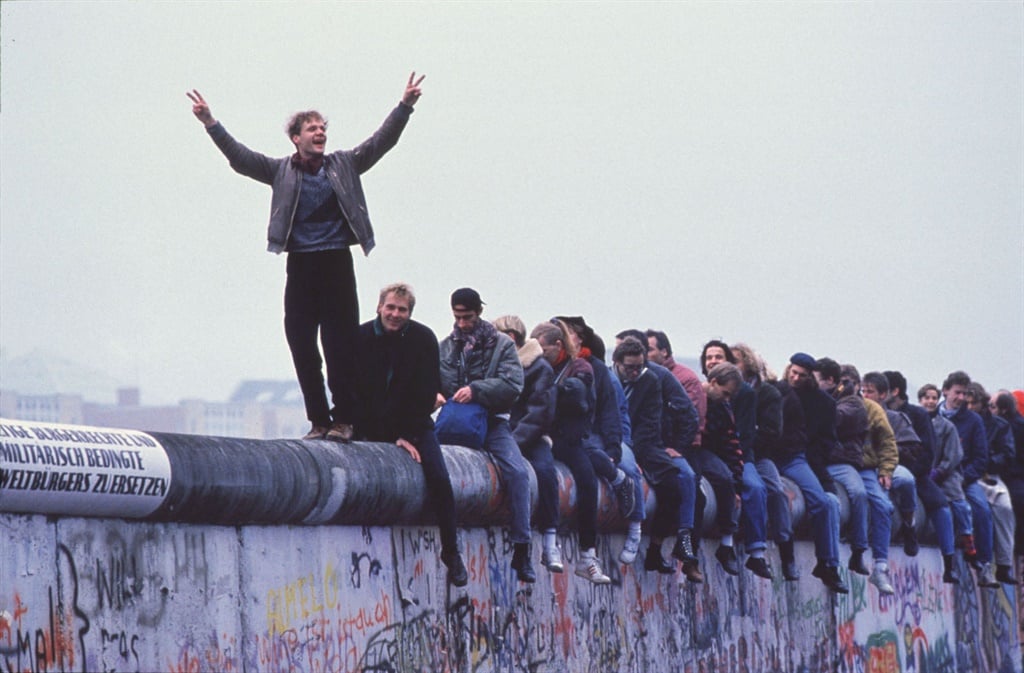
This time 30 years ago was arguably the most important in South African and world history.
In a city 13 500km away from us, masses of people surged towards both sides of the Berlin Wall, climbing on top of it and chipping at the edifice with hammers, axes and other rudimentary tools.
The scenes were emotional. For those on either side of that wall, it was the symbolic end of communism and the dawn of freedom. East Germans were celebrating the fall of the wall like it was akin to a prison breakout.
For some among us, it was a tragic moment. A pall of sadness engulfed those who believed that socialism was the future and that places like the erstwhile German Democratic Republic were a laboratory for the nirvana that a post-capitalist society should resemble. Those east Germans and the people of the Soviet bloc who were bringing down communist governments did not know that they were betraying history and humanity’s heavenly future. Or so we believed.
Those who had been on the western side of the Cold War celebrated the moment with great exuberance, with some declaring victory over communism. By the early 1990s, the dream that had begun to edge towards fruition with the 1917 Bolshevik Revolution in Russia was virtually dead.
It turned out there was no need to mourn this moment. The idea of a socialist nirvana evolving there had been one big lie. The socialist project behind the Iron Curtain had basically consisted of the elites of the ruling communist parties living large while the workers and the peasants remained in chains. In contrast to the slogan about them having nothing to lose but their chains, they found themselves even more oppressed than their counterparts in the capitalist world.
Socialism as we knew it then definitely had to die.
Author and historian Francis Fukuyama summed up the moment best when he said: “The passing of Marxism-Leninism first from China and then from the Soviet Union will mean its death as a living ideology. For a while, there may be some isolated believers in places like Managua, Pyongyang or Cambridge, Massachusetts [the home of Harvard University], the fact that there is not a single state in which it is a going concern undermines completely its pretence to being in the vanguard of human history.”
It would be left to realistic leftist thinkers like the SA Communist Party’s Joe Slovo to make sense for left-leaning people of these developments that had totally demoralised the global left. In a paper titled Has Socialism Failed, written in 1990, Slovo wrote that “socialism is undoubtedly in the throes of a crisis greater than at any time since 1917”.
“The last half of 1989 saw the dramatic collapse of most of the communist party governments of eastern Europe. Their downfall was brought about through massive upsurges, which had the support not only of the majority of the working class, but also a large slice of the membership of the ruling parties themselves. These were popular revolts against unpopular regimes; if socialists are unable to come to terms with this reality, the future of socialism is indeed bleak,” Slovo wrote.
Has Socialism Failed was the first big take on the subject in the socialist world.
As Slovo wrote this, South Africa was emerging from 1989, which was as inspiring to its people as the revolutions of the eastern bloc were to the people of those countries. In the latter months of 1989, the scent of freedom was real. Hundreds of thousands of people had poured out on to the streets in large cities and little towns in defiance of the most draconian state of emergency regulations. With no fear in their hearts, South Africans unbanned liberation movements that had been made illegal and were driven underground in the early 1960s. By October and November, government could not hold back the tide.
Strengthened by the release of some of the Rivonia Trialists, the mass democratic movement was making a final push against the Pretoria government.
Change was imminent and the inevitable happened in February 1990, when then president FW de Klerk succumbed to the tide and set South Africa on an inevitable path to democracy.
In eastern Europe, the aftermath of the revolutions of late 1989 led to chaotic democracy and the onset of unrelenting greed. The break-up of the Union of Soviet Socialist Republics and the collapse of communist governments in satellite states gave rise to a primitive capitalism run by communist chiefs and bureaucrats who had turned into greedy oligarchs.
Most of those countries have not recovered from that chaos, let alone matured into proper democracies. Thirty years later, they are still grappling with what they want to be, and some have become autocratic, nationalistic entities. The few that have become successes are veering towards the bigoted, populist route of our times.
We were fortunate that the republic that was spawned by the revolution of the summer of 1989 – a culmination of a long struggle – was a humane one based on sound constitutional values, and one that aspired to be a good citizen of the world. We built a good democracy that has withstood the authoritarian tendencies of pipe smokers, the greed of oligarchs, the racism of the historically privileged and even the ruinous instincts of a kleptocratic sex fiend. Sometimes perspective is necessary.




 Publications
Publications
 Partners
Partners








